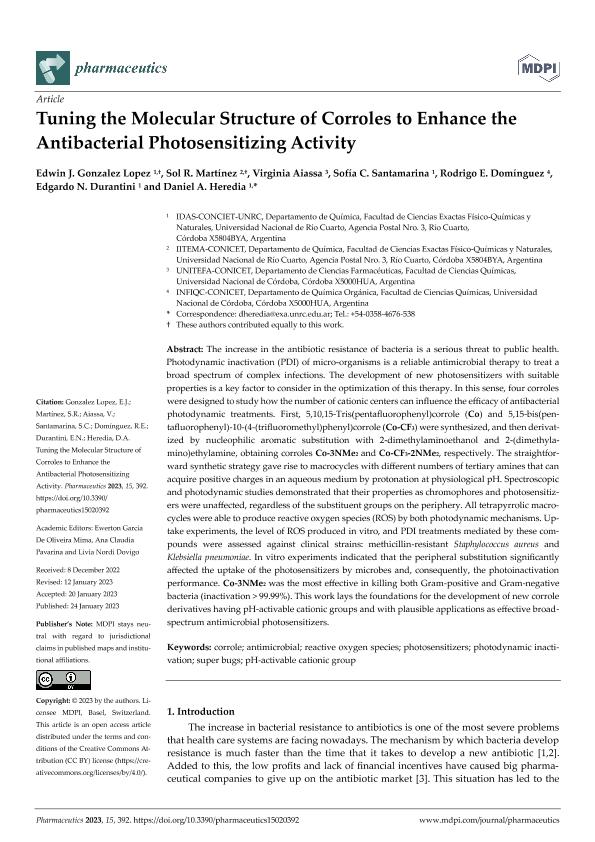Mostrar el registro sencillo del ítem
dc.contributor.author
Gonzalez Lopez, Edwin Javier

dc.contributor.author
Martinez, Sol Romina

dc.contributor.author
Aiassa, Virginia

dc.contributor.author
Santamarina, Sofia Carla

dc.contributor.author
Dominguez, Rodrigo Ezequiel

dc.contributor.author
Durantini, Edgardo Néstor

dc.contributor.author
Heredia, Daniel Alejandro

dc.date.available
2023-11-28T16:04:06Z
dc.date.issued
2023-02
dc.identifier.citation
Gonzalez Lopez, Edwin Javier; Martinez, Sol Romina; Aiassa, Virginia; Santamarina, Sofia Carla; Dominguez, Rodrigo Ezequiel; et al.; Tuning the Molecular Structure of Corroles to Enhance the Antibacterial Photosensitizing Activity; Multidisciplinary Digital Publishing Institute; Pharmaceutics; 15; 2; 2-2023; 1-17
dc.identifier.uri
http://hdl.handle.net/11336/218713
dc.description.abstract
The increase in the antibiotic resistance of bacteria is a serious threat to public health. Photodynamic inactivation (PDI) of micro-organisms is a reliable antimicrobial therapy to treat a broad spectrum of complex infections. The development of new photosensitizers with suitable properties is a key factor to consider in the optimization of this therapy. In this sense, four corroles were designed to study how the number of cationic centers can influence the efficacy of antibacterial photodynamic treatments. First, 5,10,15-Tris(pentafluorophenyl)corrole (Co) and 5,15-bis(pentafluorophenyl)-10-(4-(trifluoromethyl)phenyl)corrole (Co-CF3) were synthesized, and then derivatized by nucleophilic aromatic substitution with 2-dimethylaminoethanol and 2-(dimethylamino)ethylamine, obtaining corroles Co-3NMe2 and Co-CF3-2NMe2, respectively. The straightforward synthetic strategy gave rise to macrocycles with different numbers of tertiary amines that can acquire positive charges in an aqueous medium by protonation at physiological pH. Spectroscopic and photodynamic studies demonstrated that their properties as chromophores and photosensitizers were unaffected, regardless of the substituent groups on the periphery. All tetrapyrrolic macrocycles were able to produce reactive oxygen species (ROS) by both photodynamic mechanisms. Uptake experiments, the level of ROS produced in vitro, and PDI treatments mediated by these compounds were assessed against clinical strains: methicillin-resistant Staphylococcus aureus and Klebsiella pneumoniae. In vitro experiments indicated that the peripheral substitution significantly affected the uptake of the photosensitizers by microbes and, consequently, the photoinactivation performance. Co-3NMe2 was the most effective in killing both Gram-positive and Gram-negative bacteria (inactivation > 99.99%). This work lays the foundations for the development of new corrole derivatives having pH-activable cationic groups and with plausible applications as effective broadspectrum antimicrobial photosensitizers.
dc.format
application/pdf
dc.language.iso
eng
dc.publisher
Multidisciplinary Digital Publishing Institute
dc.rights
info:eu-repo/semantics/openAccess
dc.rights.uri
https://creativecommons.org/licenses/by-nc-sa/2.5/ar/
dc.subject
ANTIMICROBIAL
dc.subject
CORROLE
dc.subject
PH-ACTIVABLE CATIONIC GROUP
dc.subject
PHOTODYNAMIC INACTIVATION
dc.subject
PHOTOSENSITIZERS
dc.subject
REACTIVE OXYGEN SPECIES
dc.subject
SUPER BUGS
dc.subject.classification
Química Orgánica

dc.subject.classification
Ciencias Químicas

dc.subject.classification
CIENCIAS NATURALES Y EXACTAS

dc.title
Tuning the Molecular Structure of Corroles to Enhance the Antibacterial Photosensitizing Activity
dc.type
info:eu-repo/semantics/article
dc.type
info:ar-repo/semantics/artículo
dc.type
info:eu-repo/semantics/publishedVersion
dc.date.updated
2023-11-28T10:24:16Z
dc.identifier.eissn
1999-4923
dc.journal.volume
15
dc.journal.number
2
dc.journal.pagination
1-17
dc.journal.pais
Suiza

dc.description.fil
Fil: Gonzalez Lopez, Edwin Javier. Universidad Nacional de Río Cuarto. Instituto para el Desarrollo Agroindustrial y de la Salud. - Consejo Nacional de Investigaciones Científicas y Técnicas. Centro Científico Tecnológico Conicet - Córdoba. Instituto para el Desarrollo Agroindustrial y de la Salud; Argentina
dc.description.fil
Fil: Martinez, Sol Romina. Universidad Nacional de Río Cuarto. Facultad de Ciencias Exactas Fisicoquímicas y Naturales. Instituto de Investigaciones en Tecnologías Energéticas y Materiales Avanzados. - Consejo Nacional de Investigaciones Científicas y Técnicas. Centro Científico Tecnológico Conicet - Córdoba. Instituto de Investigaciones en Tecnologías Energéticas y Materiales Avanzados; Argentina
dc.description.fil
Fil: Aiassa, Virginia. Consejo Nacional de Investigaciones Científicas y Técnicas. Centro Científico Tecnológico Conicet - Córdoba. Unidad de Investigación y Desarrollo en Tecnología Farmacéutica. Universidad Nacional de Córdoba. Facultad de Ciencias Químicas. Unidad de Investigación y Desarrollo en Tecnología Farmacéutica; Argentina
dc.description.fil
Fil: Santamarina, Sofia Carla. Universidad Nacional de Río Cuarto. Instituto para el Desarrollo Agroindustrial y de la Salud. - Consejo Nacional de Investigaciones Científicas y Técnicas. Centro Científico Tecnológico Conicet - Córdoba. Instituto para el Desarrollo Agroindustrial y de la Salud; Argentina
dc.description.fil
Fil: Dominguez, Rodrigo Ezequiel. Consejo Nacional de Investigaciones Científicas y Técnicas. Centro Científico Tecnológico Conicet - Córdoba. Instituto de Investigaciones en Físico-química de Córdoba. Universidad Nacional de Córdoba. Facultad de Ciencias Químicas. Instituto de Investigaciones en Físico-química de Córdoba; Argentina
dc.description.fil
Fil: Durantini, Edgardo Néstor. Universidad Nacional de Río Cuarto. Instituto para el Desarrollo Agroindustrial y de la Salud. - Consejo Nacional de Investigaciones Científicas y Técnicas. Centro Científico Tecnológico Conicet - Córdoba. Instituto para el Desarrollo Agroindustrial y de la Salud; Argentina
dc.description.fil
Fil: Heredia, Daniel Alejandro. Universidad Nacional de Río Cuarto. Instituto para el Desarrollo Agroindustrial y de la Salud. - Consejo Nacional de Investigaciones Científicas y Técnicas. Centro Científico Tecnológico Conicet - Córdoba. Instituto para el Desarrollo Agroindustrial y de la Salud; Argentina
dc.journal.title
Pharmaceutics
dc.relation.alternativeid
info:eu-repo/semantics/altIdentifier/url/https://www.mdpi.com/1999-4923/15/2/392
dc.relation.alternativeid
info:eu-repo/semantics/altIdentifier/doi/http://dx.doi.org/10.3390/pharmaceutics15020392
Archivos asociados
